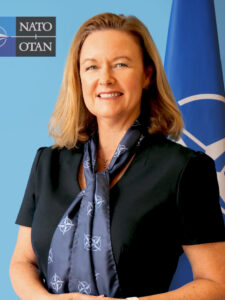
Stacy A. Cummings is the General Manager, NATO Support and Procurement Agency (NSPA).
Last week Ms. Cummings gave the Keynote Address at GOVSATCOM. Her talk, “Collaborating in Space for Defence and Security”, focused on how NSPA facilitates collaboration across the Alliance to enable NATO’s capabilities in the Space domain.
GCC SATCOM SP 2024
Conference for EU Defence and Security
7th Edition | 22 February 2024
European Convention Centre, Luxembourg
“Collaborating in Space for Defence and Security”
Minister Backes, distinguished guests, ladies and gentlemen, it is an honour to address this audience once again.
When I stood on this stage a year ago, I noted how profoundly our world had changed. Space has become a thread linking the entire defence and security ecosystem.
Today, I will share my thoughts on why collaborating in the Space domain is key for defence and security, and will explain the role that NSPA plays in facilitating collaborative initiatives across the Alliance.
NSPA’s headquarters are nearby in Capellen. It is exciting to have this conference take place right at our doorstep.
Our partnership with Luxembourg, our wonderful host nation, has only strengthened over time, notably in the areas of data, cybersecurity and communications.
With Luxembourg’s Defence leadership, we support several activities – such as armoured vehicles and the Luxembourg Government Satellite programme.
It is thanks to this partnership that last year we opened a new new era of Space cooperation within NATO, establishing the Global [Commercially Contracted] Satellite Communications Support Partnership, with Luxembourg and the United States as founding members.
The SATCOM Support Partnership is an example of best practice for collaboration in the Space domain.
It will enable Participating Nations to jointly manage, through NSPA, a full range of satellite communications services, generating synergies and economies of scale not achievable solely through national contracting processes.
The result is reduced costs and logistics footprint, with common and efficient support under a turnkey legal framework.
In June of last year, the Luxembourg Parliament approved the law for the Medium Earth Orbit Global Services (MGS) programme, the system contracted through this framework.
The MGS programme will provide critical resilient satcom capabilities for Luxembourg, its partners and NATO for defence, security and disaster recovery.
The system will leverage SES’s O3b mPOWER satellite technology and I salute our SES partners here today! You will hear from Mr Al-Sahel [new CEO of SES] later this morning.
We encourage other Allies to join our SATCOM Support Partnership. It is a great opportunity to collectively contribute to the Alliance’s strength and resilience.
In 2019, NATO adopted a new Space Policy that designated Space as an operational domain alongside air, land, maritime and cyber.
NATO’s 2022 Strategic Concept went further, officially underlining the vital role of space for NATO’s deterrence and defence posture. This updated Space Policy issued in January 2022, identified Space as essential to the Alliance’s deterrence and defence.
Today, Space is more than an enabling capability: it is an operational domain for the alliance’s security and military operations, playing a key role in the following areas:
• Positioning, navigation, and timing, which enables precision strikes, tracking of forces, and search and rescue missions;
• Early warning, which helps to ensure force protection and provides vital information on missile launches;
• Environmental monitoring, which enables meteorological forecasting and mission planning;
• Secure satellite communications, which are essential for consultation, and command and control; and
• Intelligence, surveillance, and reconnaissance, which are crucial for situational awareness, planning, and decision-making.
Let’s be clear, NATO’s aim is not to militarise space or to become an autonomous space actor, but to increase its intelligence and surveillance capabilities.
NATO will seek to complement and add value to the work of Allies and to engage with other relevant international organisations, as appropriate, avoiding unnecessary duplication of effort.
While space started as a strategic domain, today it provides operational and tactical advantages on the battlefield. This new strategic and tactical dimension of space came into stark focus with Russia’s war of aggression against Ukraine and their large-scale invasion on 24 February 2022.
The war in Ukraine will enter its third year this Saturday.
Nations have continued to support Ukraine, moving towards collective requirements for supplies and services.
The requirement for technology and assets in the Space domain has consequently increased. At present, NATO countries operate approximately 2,000 satellites, inclusive of civilian (national or multinational), commercial, military, or intelligence assets.
Yet, given the advanced and costly nature of space technology, only a few NATO countries possess their own space capabilities.
In 2023, 17 Allies alongside Sweden, launched a project-based civil and military cooperation called “Alliance Persistent Surveillance from Space” (APSS).
This initiative, managed by our sister Agency NCIA, is an important element in the implementation of the NATO Space Policy.
It establishes a virtual constellation – ‘Aquila’ – of both national and commercial space assets, such as satellites, leveraging the latest advances in commercial space technology.
Two characteristics of the APSS initiative stand out:
• Its multinational and cooperative nature leverages existing and future space assets in allied countries and connects them in the NATO virtual constellation; and
• Its data-centric approach will allow the APSS to integrate data from both government-owned assets and commercial space contributions.
This multinational and collaborative approach will allow NATO allies lacking space capabilities to access space-based intelligence and communications, while improving and expanding information sharing across the alliance. Moreover, this approach will enhance interoperability by pushing allies toward the use of common platforms.
It was in fact Luxembourg’s early contribution to this project that laid the groundwork for this transformative initiative. It will enable participating countries to contribute to Aquila through their own assets, data or funds.
APSS perfectly illustrates the benefits of Collaborating in Space for Defence and Security across nations and between governments and industry.
Government Vs Commercial
Governments are no longer alone in controlling the pace of technology. Commercial actors in Space are leading the way and are delivering game-changing breakthroughs. It is no surprise that the global space economy has seen a massive growth in recent years and is now worth an estimated 400 billion dollars.
For example, Russia’s war in Ukraine has revealed how important mini/commercial drones are in today’s warfare. The Ukrainian battlespace features a converging pattern of global big-tech companies, volunteer enthusiasts, NGOs, and the private sector playing a major role in developing solutions to military challenges. These solutions depend on the Space domain to function and connect in the battlefield ecosystem.
A particularly promising area is responsive space: Allies are facing a more contested Space domain with new kinetic and non-kinetic threats. At the same time, space technology is rapidly advancing with the proliferation of small satellites. NATO can help to build a resilient network of launch sites and capabilities across the Alliance allowing Allies to rapidly establish technologies in orbit, reconstitute disabled assets and deploy new constellations.
As technological innovations are changing the nature of peace, crisis, and conflict, it is fundamental to consider dual-use technology, finding means to leverage and adapt what is available on the commercial market.
NATO and Europe
The reality is that, ultimately, no country or continent can face our current global challenges alone.
We must urgently work together to rebuild industry capacity, incorporating commonality and interoperability into requirements for the next generation of defence systems.
This requires investment. And it’s happening.
Last week, NATO’s Secretary General stated that in 2024, NATO Allies in Europe will invest a total of 380 billion US dollars in defence to upgrade and enhance their system capabilities.
NATO, through NSPA, can act collectively, leveraging common funds to procure or develop technologies.
The Agency provides a link between industry and nations to find cost-effective and efficient solutions for NATO and partners’ defence needs.
The principles of cooperation, transparency and trust nurture this mutually beneficial relationship between industry and NSPA.
As European nations continue to address long-term defence and security challenges, NATO and the EU have strengthened their cooperation through increased coordination of operations and capability development in the Space domain.
The Joint Declaration between the European Union and NATO, which was signed last year, identified space as one of these new areas of cooperation.
NATO and the EU pledged to make better use of the benefits of space-based assets for security and defence, to strengthen dual-use innovation and invest more in capability development.
NSPA multinational
NSPA has proven to be an efficient, effective and responsive platform for durable partnerships with industry and governments to support the mission of NATO, Allied Nations and Partners.
More than ever, commonality of requirements plays a key role not only in supporting NATO missions but also civilian populations across Allies.
NSPA acts as a facilitator between industry and the Nations, enabling interoperability and a forum for multinational cooperation, where industry can play a major role.
Our existing Support Partnerships structure, such as the one we established between Luxembourg and the United States, is a unique multinational cooperation mechanism established on the initiative of two or more NATO nations enabling the consolidation and centralisation of requirements and allocating production capacity according to nations’ priorities.
Through multinational, multi-year acquisition programs and through collaborative frameworks such as our Support Partnerships, NSPA is well positioned to help Allies identify and develop multinational cooperative projects to deliver key defence capabilities required to face security challenges and support defence and security.
Our business model and experience are well suited for an increased role in acquisition and support in the space domain and we look forward to continued close cooperation with Luxembourg on this partnership and beyond.
NSPA currently has 37 Support Partnerships in place and we anticipate expanding their number and scope this year.
In the current geopolitical environment and especially in the Space domain, the partnership between industry, governments, institutions and commercial actors with the overlap of civilian and military requirements, contribute to effective global security and defence.
We are scanning the horizon for new opportunities where we can bring together coalitions of Allies and rapidly procure or develop space capabilities.
Fostering collaboration, coherence and commonality for the development of defense and security capabilities brings benefits to all parties involved.
This will remain a central concern across NATO and the European Union in the months and years to come.
NSPA will work to ensure that NATO and Allied Nations obtain the best capabilities in Space and all domains at the best value, achieving economies of scale and leveraging the most advanced technology available.
I thank you for your attention. It was my pleasure to be here today.


